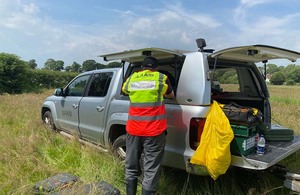- £440 million package for victim support services in England and Wales
- Pre-recorded evidence to be rolled out to Crown Courts across the North East
- Local criminal justice scorecards published for the first time
The government announced the multi-year funding package as it publishes local criminal justice scorecards for the first time – shining a light on the work of agencies such as the police and Crown Prosecution Service at a regional level.
At present, funding for victim support services is confirmed annually. The move to a long-term model – with at least £147m per year up to 2025 – will allow charities and service providers to plan for the future, build capacity and strengthen their resilience to help even more victims. It comes as Police and Crime Commissioners report that the number of victims accessing support increased by 15% between 2019/20 and 2020/21.
The money will fund emotional, practical and therapeutic support for victims of crime such as women and girls affected by domestic abuse. This includes helping fund more specialist Independent Domestic Violence Advisors (IDVAs) and Independent Sexual Violence Advisors (ISVAs). The investment will provide greater consistency for people accessing these services and ensure help is always there when needed.
Deputy Prime Minister, Lord Chancellor and Secretary of State for Justice, Dominic Raab said:
We want more victims to have the confidence to come forward, so that more criminals can be prosecuted and victims can get the justice they deserve.
We’re increasing transparency through local scorecards, rolling out pre-recorded cross-examination for rape victims to more Crown Courts, and boosting funding for vital support services to £440 million over the next three years so that victims get the support they need.
The local criminal justice scorecards include information on the time taken for cases to be investigated by the police, for someone to be charged and for the case to be completed at court. The data can be broken down by local police forces, CPS area as well as Local Criminal Justice Boards. The scorecards also include information on victim engagement. Ministers are determined to increase confidence in the criminal justice system so that more victims stick with the process to ensure justice is served. This data will be published alongside scorecards detailing the national picture.
Both the local and national datasets spotlight, specifically, the response to rape and sexual violence – delivering on a key pledge in the government’s Rape Review. The aim is to use this data to help drive a major increase in the number of prosecutions reaching court.
In addition to this, it was also confirmed today that measures which spare victims of rape and modern slavery the trauma of giving evidence in the full glare of a courtroom will be rolled out to the North East of England. Known as Section 28, the measure allows victims – subject to a successful application to the court – to have their cross-examination pre-recorded earlier in the process and outside of the live trial. It can help to reduce stress to ensure they give their best evidence.
The provision will be introduced to Crown Courts in York, Grimsby, Hull, Bradford and Teesside in the coming weeks as part of a phased national roll out. It is already available at Liverpool, Leeds, Kingston-Upon-Thames, Harrow, Isleworth, Wood Green and Durham Crown Courts.
Nicole Jacobs, the Domestic Abuse Commissioner, said:
I very much welcome the announcement by the Ministry of Justice about multi-year funding. It’s essential that domestic abuse victims and survivors can rely on getting the long term support they need and deserve.
For too long domestic abuse services have been forced to lurch from one short term financial settlement to another and I delighted to see the Ministry of Justice is addressing this issue.
The Victims’ Commissioner for England & Wales, Dame Vera Baird QC, said:
For many victims of crime, seeking justice can be an unacceptably slow and frustrating experience. But there are marked differences across the country and some areas notably outperform others. These new scorecards will allow us to reveal regional discrepancies, identify best practice and expose weak links.
But scorecards are not a panacea and numerical snapshots do not tell the whole story. They will need to be complemented by the victims’ voice to provide a more rounded picture.
The rollout of section 28 to more courts is a positive move that will help to reduce unnecessary stress and trauma for more victims, and I’m pleased to see this work gather momentum.
Today’s announcement builds on recent government action to increase confidence in the justice system including bringing forward a new Victims’ Bill, ensuring violent and sexual offenders spend longer in prison and investing nearly half a billion pounds to deliver swifter justice through the courts.
It comes as the government relaunches it #ItStillMatters campaign – to help raise awareness of sexual abuse support services so that victims can get the help they need.
The Association of Police and Crime Commissioners (APCC), Criminal Justice Lead, David Lloyd PCC said:
Police and Crime Commissioners bring Criminal Justice partners together to improve performance on behalf of victims and our local communities.
Using local scorecards we will gain a greater understanding of the criminal justice system’s performance and we will be able to address issues in a more targeted way.
Fay Maxted OBE, Chief Executive of The Survivors Trust said:
I know from Survivors Trust Members Agencies, who are all specialist voluntary sector rape and sexual abuse support services, that the additional, long-term funding announced is really welcome and will help them to meet the increasing demand for therapy and advocacy that we’ve seen over the past few years.
Alongside this, the wider roll out of Section 28 pre-recorded evidence will make such a difference for rape victims who often tell us that giving evidence in court feels like re-traumatisation instead of the chance to say what happened to them.
Joe Shalam, Policy Director at the Centre for Social Justice, said:
It is welcome to see the government continue to raise the ambitions for victims of crime in the justice system. The CSJ Commission on Sexual Abuse and Exploitation exposed alarming shortfalls in the support available to those affected by heinous criminal acts.
The measures set out today, including local victim scorecards and the wider rollout of pre-recorded evidence, will drive further progress on the protections in place for the most vulnerable victims of crime.
National Police Chiefs’ Council Lead for Rape and Serious Sexual Assault, Chief Constable Sarah Crew said:
As the national lead on rape and serious sexual assault I welcome this funding for services that provide such a vital role in helping victims. Policing performs an important role, especially in the pursuit of perpetrators, but it’s vital that the correct funding of services across the criminal justice system is there to support victims of these horrific crimes.
We’re working harder than ever with the Crown Prosecution Service in our joint commitment to increase charging and conviction rates for rape, which remain too low. Operation Soteria, a new and research based approach to rape cases, is being trialled across five forces and the feedback from that is encouraging. Our Joint National Action Plan is already seeing improvement and progress across the board, recognising the importance of our relationship in helping those most in need.
The publication of local scorecards provide an opportunity for greater openness and transparency with victims and the public. The availability of this data across all partners in one place, for the first time, is central to developing a more accessible and understandable system. We will now focus on looking at the data and work on improving our response where needed.
Notes to editors:
- £147m per year over the next three years is the minimum funding that services will receive including those commissioned via Police and Crime Commissioners through core funding. It forms part of last year’s Spending Review commitment to bolster support for victims to £185m by 2024/25. This additional money will go towards increasing the number of ISVAs and IDVAs from 700 to 1000 by 2024/25, establishing a 24/7 service for victims of rape and sexual violence, and ensuring there is flexibility and capacity to respond to emerging support needs and demand for victims of crime.
- The Victims’ Bill consultation closed on 3 February 2022. The government will respond in due course.
- If you’ve ever experienced sexual violence or sexual abuse, you can get confidential support from specialists who will listen to you, believe you and understand how hard it is to talk about. Visit gov.uk/SexualAbuseSupport to see the support on offer.
On Section 28:
- Both the defence and prosecution lawyers will be present in court during the pre-recording as will the judge and the defendant.
- The independent judiciary will be responsible to overseeing the use of s.28 and will have discretion to ensure that the interests of justice are served.
- Pre-recording cross-examination preserves a defendant’s right to a fair trial.
- In 2021 more than 1,800 witnesses used the S.28 provision to pre-record their evidence. It is already available at Liverpool, Leeds, Kingston-Upon-Thames, Harrow, Isleworth, Wood Green and Durham Crown Courts and we are working with the judiciary, police and CPS to phase it in across all Crown Courts as soon as practicable.
- Vulnerable witnesses and victims are defined as all child witnesses under 18 and any witness whose quality of evidence is likely to be diminished because they are suffering from a mental disorder or physical disability or has significant impairment of intelligence and social functioning.
- Intimidated witnesses and victims for the purposes of this pilot are defined as complainants or witnesses of sexual offences and modern slavery offences.


